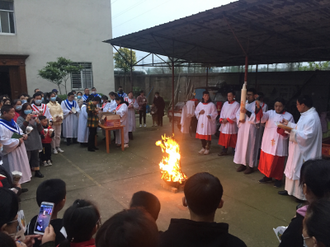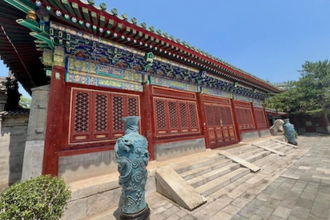China: Easter Vigil in Wuhan

Our correspondent in China writes:
Several hours before the Easter Vigil began at the parish church in Xiantao, near Wuhan, the sound of firecrackers and fireworks filled the air. The blaze of sound continued throughout the day, seemingly determined to make its presence felt. However, this sound was not connected to the Easter preparations of the parishioners who continued to work quietly to prepare the evening liturgy. Each year the fourth day of April is when Chinese people remember their deceased relatives. This year the day of ancestral remembering coincided with Easter Sunday.
The traditional day to remember deceased relatives is known as Tomb Sweeping day, a national holiday in China. Millions of people return home to clean the burial places of their ancestors as well as to set off firecrackers and fireworks. The possibility of an early fulfilling of the family duty to care for graves resulted in what initially seemed like a gradual build up to the Easter Vigil. Two of the priests living at the parish were trying to balance various commitments at the weekend as they obliged a few Catholic families by going to nearby graveyards to bless graves while also keeping an eye on the clock in preparation for the Easter Vigil.
As Saturday evening approached and the heavy rain of the previous two days had thankfully ceased, it was also timely that the sound of firecrackers and fireworks had dissolved with the fading light of day. The focus could then move to the area in the church compound where the Easter Vigil was due to begin.
In union with Church communities throughout China that were unable to celebrate the Easter Vigil last year, a great fire was lit to announce the Resurrection. Light had broken the darkness. The message was communicated intially in a visual way and then proclaimied in word and song. The harsh reality of the suffering and death of Jesus, reminders of all suffering and sinfulness in our world, were now being overtaken by the light of the Paschal fire, the hope that God brings to our world, the great emergence of life out of death.
The Paschal candle was lit from the bright fire and its light was then shared among the congregation, a time of silence linking each of us to the hope that is symbolised in this great ceremony. Then we joined the slow procession to the nearby church. As the big church filled to capacity, the wonderful sea of candlelight raised the possibility in my mind that this could be the most scenic setting that many of these people experience in the year, the simplicity of their homes at the intersection between rural and urban life often being one that is far below the minimum level of comfort that is normal in other countries.
The well prepared liturgy had a full compliment of readings, the baptism of four adults and plenty of good singing. Immediately after people began receiving communion, my attention was drawn to a buzz of activity developing at one side of the church. People began to congregate near the large vessels of water that had been blessed an hour earlier. Here they filled bottles and larger containers that they had been brought to the church. In a scene that seemed to be borrowed from pilgrimages to Lourdes where people gather large quantities of water on the last day to bring home to their own countries, the Xiantao parishoners were engaged in a long established tradition that sees them trusting in the spiritual benefits of the water that is blessed at the Easter Vigil.
A little short of three hours from the time the Paschal candle had been lit outdoors, the final hymn of the evening celebration was sung in the church. Gradually people moved outdoors and gathered in groups to wish each other well. Aware of how the COVID-19 restrictions all over China one year ago had prevented most Catholics from attending Easter celebrations, this year's celebration was one of great joy, a celebration that will hopefully show Catholics around the world that time can eventually bring changes, a reflection of the unbounded hope that is central to the meaning of Easter.
On Monday afternoon as I returned to Wuhan by bus, I noticed groupings of graves at the edges of many fields, the grass neatly trimmed and bright floral displays newly erected. One year after the shock of China being hit by the pandemic, the coincidental overlap of Tomb Sweeping and Easter Sunday seemed to carry its own meaning. People of various traditions were celebrating on the same weekend in China, a remembering of special people and important events in previous times, all combined with the celebration of how such remembering leads to new life in our own time.


















